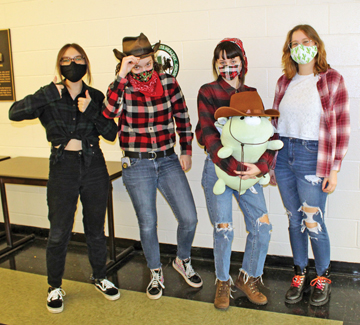High school seniors face obstacles, restricted activities because of COVID
by Kathleen Steele Gaivin
The world as they know it changed drastically for 2021’s graduating seniors midway through their junior year, as the COVID-19 pandemic brought activities to a screeching halt. Instead of classroom camaraderie, football games and dances, high school students were subjected to hybrid learning, and athletes had to learn a new way to compete.
“I don’t think freshmen have any idea what high school is supposed to be like,” said Casey Wright, principal of Nordonia High School.
Nordonia students began this year with hybrid learning, two days a week inside the classroom and three days of remote learning. Only part of the student body was in school on any given day. Only since winter break have students returned to the classroom full time with any semblance of normalcy, senior Lindsey Beattie said.
Beattie is student council president, a member of National Honor Society and Varsity Club, as well as a soccer player.
“I don’t want to complain,’’ Louis Hover said. “We just have to make do. It’s just something we have to deal with. Something we’re getting used to. We just have to fight on.”
The senior is a member of student council, vice president of National Honor Society and on the board of several leadership groups. He said he found remote learning difficult, because the work depends so much on motivation and self-discipline. He also said he found it tedious to get up every morning and do essentially the same thing over again for each of his six classes.
“We haven’t really even had a normal senior year. We haven’t even gotten a taste,” said senior class officer and National Honor Society President Grace Koperna.
Some students found hybrid learning challenging, but Koperna said she liked it. As a senior, she said she liked the flexibility it provided.
“I’ve always been an individual learner,” she said.
Hover is an avid baseball player. He was thrilled last year to make the high school varsity, but the season never started. First, he said, they were told to wait two weeks then two more weeks and so on for a season that never came. He is looking forward to playing this spring.
Students have lost some of their typical activities. There was no homecoming dance in the fall and spirit week was scaled back this spring. Student council was able to host a Halloween trunk-or-treat drive-through event in the high school parking lot, and Beattie said she hopes there will be a drive-thru at Easter, where children can wave to the Easter Bunny and receive treats.
National Honor Society helped collect donations to stock Easter baskets for The Emergency Assistance Center to distribute. Nordonia’s younger students lost out on Camp Huddle, a one-day camp sponsored by the Varsity Club, where high school athletes partner with special needs children for a day of sports and play. Beattie said the athletes and the children look forward to the fall event, and they are hoping to have it in some form this spring.
Athletic teams were permitted to play this year, but there were many changes to keep teams safe. Masks were worn except during actual playing, and players were required to stay six feet apart on the sidelines. Beattie said there was no bonding week with incoming freshmen.
College planning has been different, as seniors try to deal with the pandemic. Beattie said many of her classmates who had planned to go to far-off places are looking at staying home and taking college classes online.
“Some people really like remote learning,” she said.
Visits to colleges have been limited, too. Only recently have some colleges started offering in-person tours again. Beattie plans to look at schools before reaching a decision.
Koperna said applying for academic scholarships hasn’t changed much, but Beattie said some schools are offering less money because they have suffered financial hits from reduced enrollment. She said local scholarships are still available, and the high school is helping students search for local funding sources. Koperna said students need to hunt for scholarships tailored to their needs and apply for anything for which they might be eligible.
“It’s a relief to still have access to scholarships,” she said.
Athletic scholarships are a different story. Some scholarships still exist, but there are fewer available for this graduating class. It is also more difficult to meet with recruiters. This is considered a “dead period” for Division I colleges, because communication is done solely via email. No other contact is permitted between D-I coaches and students.
Hover has dreamed of becoming a college baseball player since he was 10. He has found that it is harder to realize that dream than it was a year or two ago. He said he’s talked to several coaches, but the offers are down this year. College athletes were given an extra year of eligibility, so there are fewer scholarships for freshmen. Several coaches told Hover they won’t be signing a single player from the high school class of 2021.
“I wasn’t expecting that,” he said.
Hover has been offered an academic scholarship at Denison University, a Division III school. He is also waiting to hear if he will qualify for West Point before making a decision about his future.
Koperna said she has applied to several colleges and hopes to play soccer. Like Hover, she has found the process difficult because of the dead period. She said she has had communication with several coaches, but it is hard to make a personal connection.
“Zoom is great and all, but trying to pick a college and plan for the rest of your life is hard,” Koperna said.
The high school experience has changed significantly since last March, but these resilient seniors are still looking forward to bright futures. ∞

